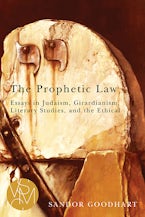To read literature is to read the way literature reads. René Girard’s immense body of work supports this thesis bountifully. Whether engaging the European novel, ancient Greek tragedy, Shakespeare’s plays, or Jewish and Christian scripture, Girard teaches us to read prophetically, not by offering a method he has developed, but by presenting the methodologies they have developed, the interpretative readings already available within (and constitutive of) such bodies of classical writing. In The Prophetic Law, literary scholar, theorist, and critic Sandor Goodhart divides his essays on René Girard since 1983 into four groupings. In three, he addresses Girardian concerns with Biblical scripture (Genesis and Exodus), literature (the European novel and Shakespeare), and philosophy and religious studies issues (especially ethical and Jewish subject matters). In a fourth section, he reproduces some of the polemical exchanges in which he has participated with others—including René Girard himself—as part of what could justly be deemed Jewish-Christian dialogue. The twelve texts that make up the heart of this captivating volume constitute the bulk of the author’s writings to date on Girard outside of his three previous books on Girardian topics. Taken together, they offer a comprehensive engagement with Girard’s sharpest and most original literary, anthropological, and scriptural insights.
ContentsAcknowledgmentsAn Introduction to Girardian ReadingPart One. Dialogue Among Girardians“I Am Joseph”: Judaism, Anti-Idolatry, and the Prophetic LawA Jewish-Christian Dialogueal lo-chamas ’asah (Although He Had Done No Violence): René Girard and the Innocent VictimResponse by René Girard and Reply to René GirardPart Two. Girardian Reading and the ScripturalThe End of Sacrifice: Reading René Girard and the Hebrew BibleFrom Sacrificial Violence to Responsibility: The Education of Moses in Exodus 2–4Part Three. Girardian Reading and the LiteraryReading Religion, Literature, and the End of Desire: Mensongea romantique et vérité romanesque at Fifty“Nothing Extenuate”: Love, Jealousy, and Reading in Shakespeare’s OthelloPart Four. Girardian Reading and the EthicalReading Halachically and Aggadically: A Response to Reuven KimelmanThe Self and Other People: Reading Conflict Resolution and Reconciliation with René Girard and Emmanuel LevinasFrom the Sacred to the Holy: René Girard, Emmanuel Levinas, and SubstitutionBack to the Future: The Prophetic and the Apocalyptic in Jewish and Christian SettingsConclusions: Reading René GirardNotesBibliographyIndex


